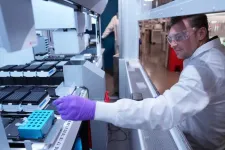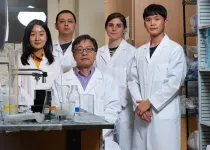(Press-News.org) Relatives are a great resource in today's healthcare system. In Norway, relatives' efforts add up to approximately the same number of person-years as provided by the public municipal health and care services.
But the role of relatives is changing. Changes in the age composition of the population, changed social structures and family patterns will affect how many relatives each of us has to support us in the future.
In order to look after relatives in the best possible way, it is necessary to have increased knowledge about relatives' involvement and the need for support in various health service models. This is why this type of research is important.
Home hospitals a sustainable solution
More and more treatment is being provided at patients' homes. Home hospitals are a service model that offers treatment and follow-up for acute or semi-acute conditions in patients' homes. The approach is an alternative to traditional in-hospital treatment.
International studies show that home hospitals are a good solution for patients, and as a sustainable solution for the future.
The corona pandemic strengthened the home hospital's position. However, we know little about how relatives become involved and how they experience their role when patients receive hospital treatment in their own homes.
A group of researchers at the Norwegian University of Science and Technology (NTNU) and the Health Innovation Center investigated this question. Their findings were published in BMC Health Services Research.
The study shows that relatives have an important role in home hospitals. It gives us insight into how their involvement varies in different phases of the treatment process when hospital treatment is moved home.
Preparation for something new and unknown
Relatives in the study described a hectic preparation phase before their loved ones came home. But at the same time, relatives were not that involved in the decision to choose home hospital over traditional hospital treatment.
The patients were eager to return home, and relatives also wanted them to come home, because there were benefits for the patient, but also for themselves and the family.
Relatives further described a range of information needs in this phase. Many experienced that it was demanding to handle the amount of information they received.
Adapting to a new everyday life at home
Relatives described conflicting feelings as the treatment was moved home. They felt strong joy at being with their loved one again, but also worries and uncertainty about what might happen to the patient at home.
The first period at home was characterized by stress and uncertainty, but family members felt that they had good follow-up and support from health personnel who visited them at home.
Home hospitals also affected the relationship between patient and relatives, for better or for worse. Several described friction between each other, but also that experiencing and coping with this situation together contributed to a shared sense of pride.
Everyday life quickly returned
As the treatment worked and the patients got better, the patients' need for care, nursing and support decreased. This also meant that the need for relatives to be involved also decreased. Many individuals described this as a seamless transition to everyday life to what it was like before the patient was treated in the home hospitals.
Relatives generally say that they are satisfied with home hospitals, and all participants would contribute as relatives again if needed. They found motivation and meaning in helping with care, nurturing and support at home, and felt it was beneficial for both the patient and the family.
Useful knowledge for healthcare personnel
The research on relatives' role and involvement in home hospitals for adults is the first of its kind in a Norwegian context. Internationally too, very few studies have explored the topic..
The researchers believe the study contributes new, important knowledge that will be useful in the development of future health service models where hospital treatment is provided in the home, both here in Norway and internationally.
They also hope that this information on next of kin's involvement and roles in various phases of home hospital treatment can act as a guide for healthcare personnel. Hopefully they can get help to provide adequate support at the right time to reduce the risk of negative consequences of being relatives of a patient being treated in a home hospital.
Reference: Karlsen, L., Mjølstad, B.P., Løfaldli, B.B. et al. Family caregiver involvement and role in hospital at home for adults: the patients' and family caregivers' perspective - a Norwegian qualitative study. BMC Health Serv Res 23, 499 (2023). https://doi.org/10.1186/s12913-023-09531-3
END
This is what relatives think about home-based hospital care
2023-07-18
ELSE PRESS RELEASES FROM THIS DATE:
Howard and Susan Elias make $16.25 million gift to fund cancer neuroscience research at MD Anderson
2023-07-18
HOUSTON ― The University of Texas MD Anderson Cancer Center today announced a
$16.25 million gift from Howard and Susan Elias to accelerate brain tumor and cancer neuroscience research, an emerging field focused on integrating the role of the nervous system in cancer. Howard Elias’ son, Harrison, was diagnosed with brain cancer and underwent successful surgery in 2000. Six years earlier, Howard’s father had died of glioblastoma. These separate diagnoses sparked a giving program over the years, leading to this latest gift which represents ...
Allen Institute for Immunology partners with Lilly to better understand autoimmune disease
2023-07-18
SEATTLE — July 18, 2023 — In a significant milestone for the Allen Institute for Immunology, a division of the Allen Institute, researchers and staff will collaborate with private industry researchers to aid in the detailed molecular understanding of disease, in service of developing new treatments and therapies to improve human health.
Specifically, Allen Institute scientists will work with researchers from Eli Lilly and Company (Lilly) to investigate and profile disease state diversity and biomarkers for drug response involving atopic dermatitis (eczema) and rheumatoid arthritis using Allen Institute-developed ...
Using AI to speed up vaccine development against Disease X
2023-07-18
CEPI, the Coalition for Epidemic Preparedness Innovations, and the Houston Methodist Research Institute (HMRI), have today announced a partnership to combine cutting-edge artificial intelligence (AI) technology with established laboratory techniques to speed up development of future vaccines against novel viral threats (also known as Disease X). HMRI will lead a consortium including experts from Argonne National Laboratory (University of Chicago), J Craig Venter Research Institute, La Jolla Institute, The University of Texas Medical Branch, and The University of Texas, ...
Japanese beetles could spread throughout Washington state in 20 years
2023-07-18
PULLMAN, Wash. – Without intervention, the colorful but devastating Japanese beetle could make its way across the evergreen state within two decades, according to a study of their potential dispersion.
The iridescent, green-and-copper beetles damage plants by “skeletonizing” their leaves, chewing up all the soft green parts between the veins. They eat over 300 plants and pose a serious threat to Washington agriculture as some of their favorite crops include grapes, hops and cherries.
Once established, Japanese beetles are tough to eradicate, but it may be possible to keep them under control, said David Crowder, a Washington State University entomologist.
“These ...
Will artificial intelligence (AI) end civilization? Lero researchers seek public's views on AI and software
2023-07-18
Will artificial intelligence (AI) end civilisation? Researchers at Lero, the Science Foundation Ireland Research Centre for Software and University College Cork, are seeking help determining what the public believes and knows about AI and software more generally.
Psychologist Dr Sarah Robinson, a senior postdoctoral researcher with Lero, is asking members of the public to take part in a ten-minute anonymised online survey to establish what peoples’ hopes and fears are for AI and software in general.
“As the experts debate, little attention is given to what the public thinks – and the debate is raging. Some ...
NIH grant backs Rice U. lab’s sickle cell disease research
2023-07-18
HOUSTON – (July 18, 2023) – Rice University bioengineer Gang Bao and his team have won a 4-year, $2.6 million grant from the National Institutes of Health to address critical questions surrounding the safety and efficacy of using gene editing to treat sickle cell disease.
Because it is caused by a mutation in a single gene, sickle cell disease is a prime candidate for gene editing treatments using tools such as CRISPR-Cas9.
“Sickle cell disease affects over five million people worldwide, and ...
EMBARGOED: Women less likely to be routed to comprehensive stroke centers for large vessel acute ischemic stroke, according to UTHealth Houston research
2023-07-18
Despite having worse stroke symptoms and living within comparable distances to comprehensive stroke centers, women with large vessel occlusion acute ischemic stroke are less likely to be routed to the centers compared to men, according to a new study from UTHealth Houston.
Led by corresponding author Sunil Sheth, MD, associate professor of neurology and director of the vascular neurology program with McGovern Medical School at UTHealth Houston, and senior author Youngran Kim, PhD, assistant professor of management, policy, and community health with UTHealth Houston School of Public Health, the study was published today in the Journal of the American ...
IOP Publishing’s latest Environmental Research series journals now open for submissions
2023-07-18
IOP Publishing’s (IOPP) new environmental research journals are now open for submissions. Announced earlier this year, the two new open access (OA) journals: Environmental Research: Energy and Environmental Research: Food Systems are the latest additions to IOPP’s expanding Environmental Research Series which now includes eight open access titles.
IOPP’s Environmental Research series builds on the established reputation of the journal Environmental Research Letters (ERL) and shares the same outstanding levels of author service, inclusive editorial policies, strict quality assurance and has open science principles at its core.
IOP ...
This sugar kills honeybees—it could also help fight cancer
2023-07-18
LA JOLLA, CALIF. – July 18, 2023 –Research from Sanford Burnham Prebys and the Osaka International Cancer Institute has shed new light on the anti-cancer properties of mannose, a sugar that is crucial to many physiological processes in humans and is also known to inhibit the growth of cancer cells. The findings, published in the journal eLife, suggest that mannose could be a helpful secondary treatment for cancer.
“This sugar could give cancer an extra punch alongside other treatments,” says study co-author Hudson Freeze, Ph.D., director of the Human Genetics ...
Smiles all round: clinical trial shows that a toothpaste containing synthetic tooth minerals can prevent cavities as effectively as fluoride
2023-07-18
Brushing twice a day keeps the dentist away – but can we improve on the toothpaste we use to maintain clean teeth, preventing medical issues that spiral from poor dental health? Most toothpastes use fluoride, a powerful tool for oral hygiene. However, fluoride can pose health problems in some cases, especially for children who consume too much fluoride by swallowing most of their toothpaste: children normally use only a tiny dose of toothpaste to avoid these problems, but that reduces toothbrushing efficacy. In the search for alternatives, a team of international scientists and Polish clinicians have identified a hydroxyapatite toothpaste that works just as well as fluoride toothpaste ...





